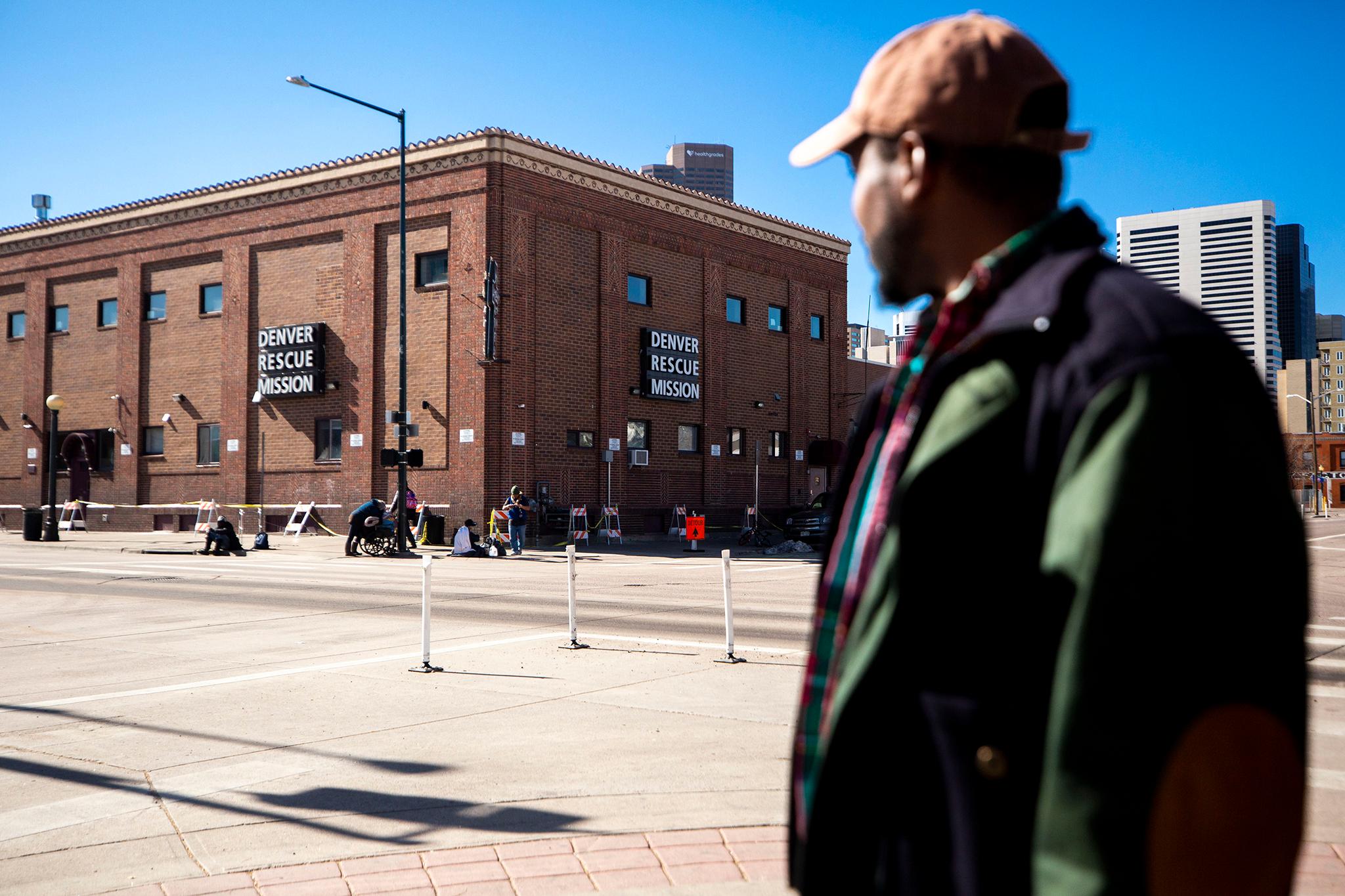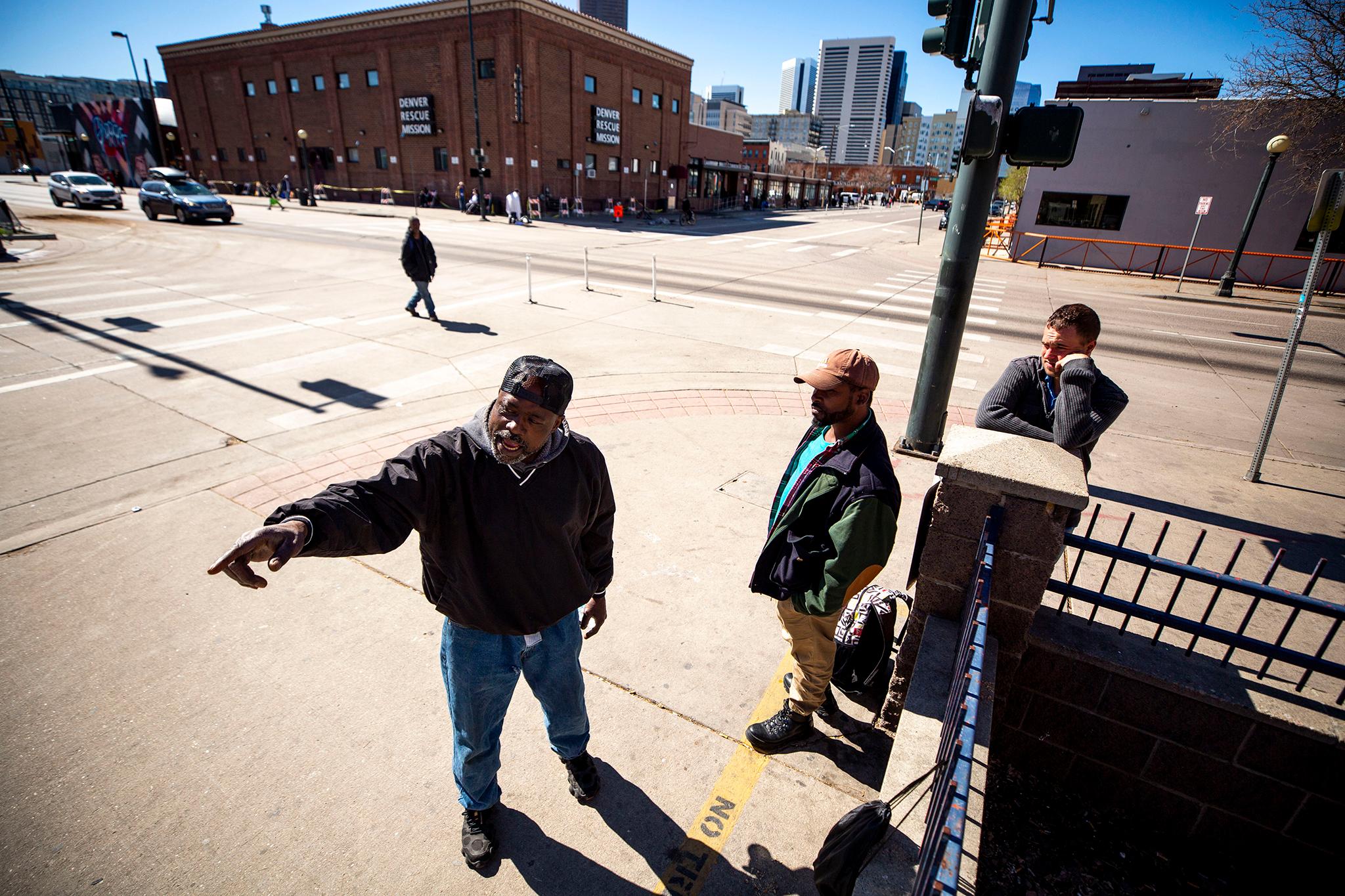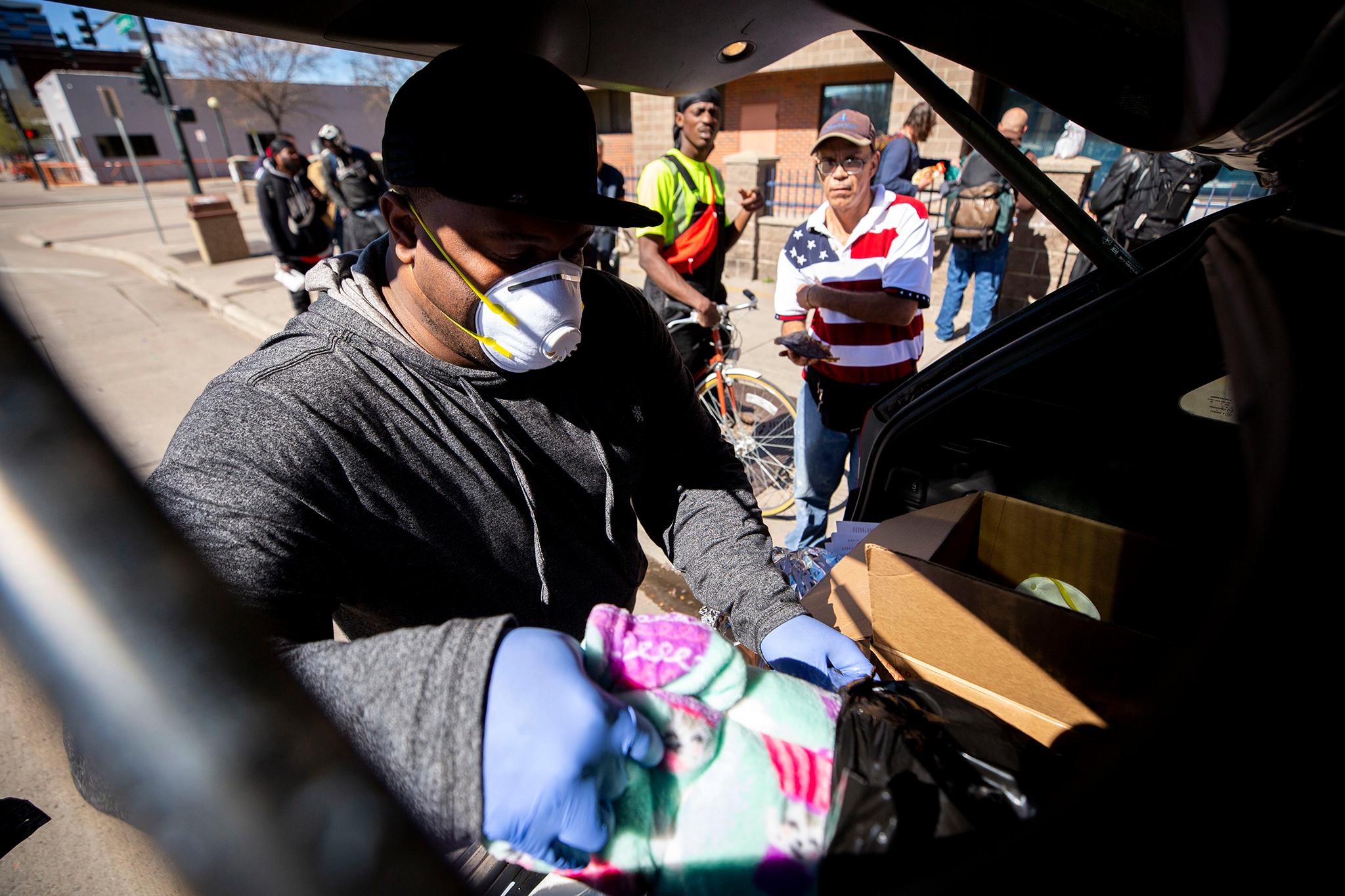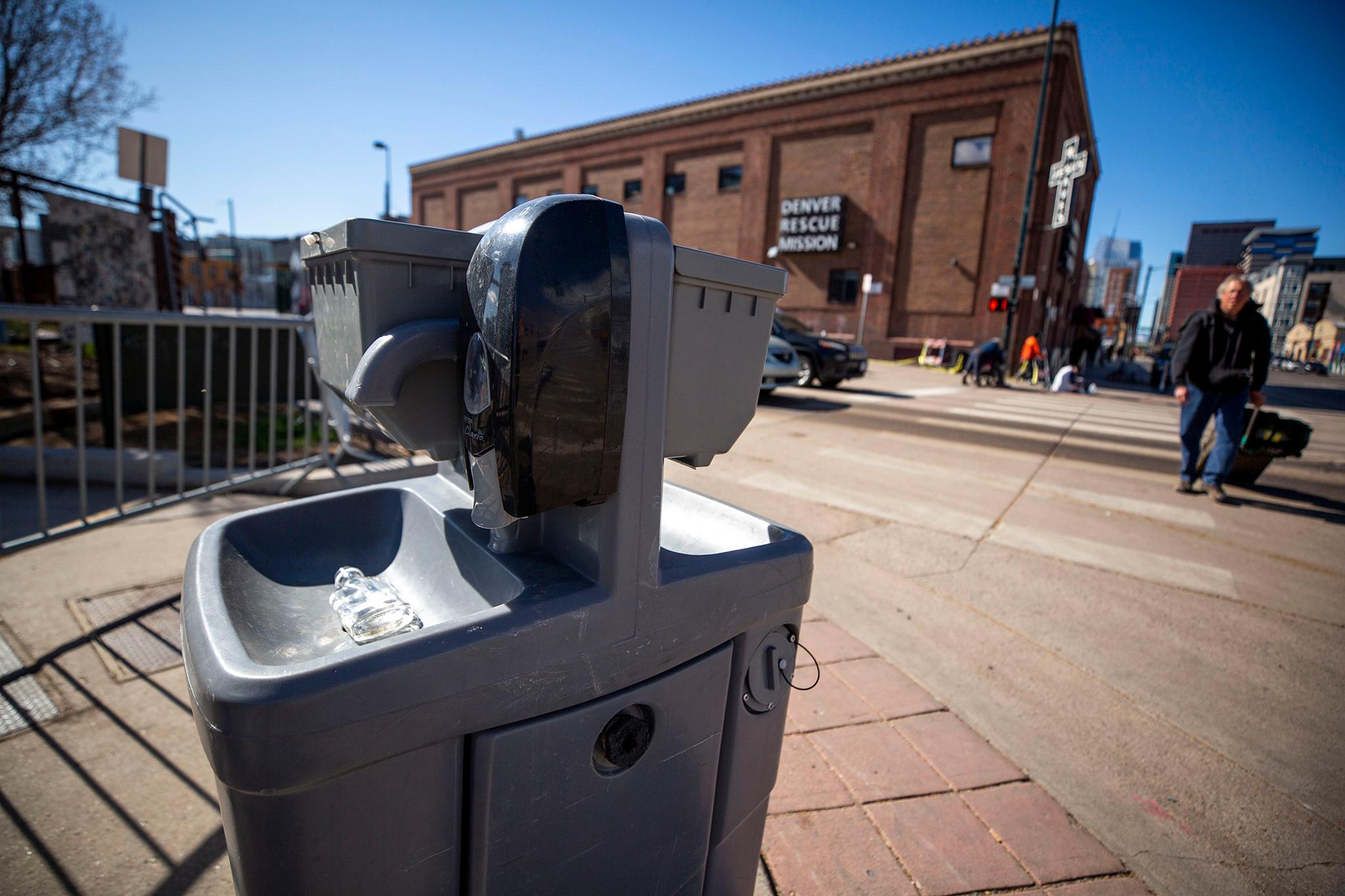When he heard from others who live on the streets that everyone in Denver had been told to stay home, Davon Moss was skeptical.
He used his phone to check the news and discovered that Mayor Michael Hancock had, in fact, ordered residents to stay home except to get groceries, medical supplies and medicine from Tuesday at 5 p.m. until at least April 10. The measure is meant to slow the spread of the new coronavirus.
"The first thing I thought about, 'Home, what home? What home do I go to?'" Moss said.
The mayor's stay-home order exempts people experiencing homelessness, but urges them to obtain shelter.
"Government and other entities are strongly urged to make such shelter available as soon as possible and to the maximum extent practicable," the executive order added. Among those exempted from the stay-at-home order were those working for organizations that provide shelter, food and social services to the needy.
Moss said he wanted to know: "What other places can we go to for shelter, for food, for hygiene products?"
"Are they creating more resources?" Moss said. "And this stay-at home -- if an individual doesn't have a home, where do they stay?"

People experiencing homelessness are not more likely than others to contract COVID-19, the potentially fatal disease caused by the coronavirus. But underlying health conditions and the stress of being unhoused means they would be especially hard hit if they fell ill.
On any given night in Denver last year, according to the most recent Point in Time survey, nearly 4,000 people were experiencing homelessness. Moss, a 32-year-old who has experienced homelessness off and on since he aged out of the foster care system as a teen, said Denver's existing shelters were crowded and unclean. At times, he has chosen to sleep on the streets over going to a shelter. He's also spent nights outside when he missed a shelter curfew.
Tuesday, Moss and two friends gathered outside the Denver Rescue Mission, at 1130 Park Ave. West, and discussed whether they could scrape together the $400 or so they thought they would need for a week in a hotel room. One of Moss's friends was working and the other has disability benefits. But Moss said it has been increasingly difficult to get the day jobs -- among them busing tables at restaurants -- on which he has relied, along with food stamps, to get by. Restaurants have been laying off employees since March 17, when in-person dining was stopped as an anti-coronavirus measure.
The coronavirus outbreak has underscored the shortcomings of Denver's shelter system.
A Denver County judge ruled late last year that the city's urban camping ban was unconstitutional. The judge agreed with a man who had been ticketed under the camping ordinance that because Denver's shelters are inadequate, the ban adopted by City Council in 2012 violates constitutional protections against cruel and unusual punishment by outlawing on public property such activities as eating, sleeping or storing belongings while sheltering with tents, tarps or blankets.
The city has appealed the judge's decision and had argued during the trial that its shelters met emergency needs. But the city also embarked last year on a project to improve shelters, including ensuring more are open beyond overnight.
Tuesday, Councilwoman Candi CdeBaca, whose District 9 is home to the Denver Rescue Mission and other homelessness service providers, announced she and other public officials and community partners had signed a petition calling on Mayor Hancock to end the camping ban and clean-ups that force people camping on the streets to move along during the COVID-19 crisis.
"As of 5:00 p.m. on Tuesday, March 24, all Denver residents will be under a Stay At Home order until at least April 10," the petition read. "People experiencing homelessness are Denver residents too. So what does this mean for our community members without homes to stay in?
"They are left with an impossible choice: To stay in a shelter with hundreds of others (increasing the risk of disease spread in closed-air, close contact with others). Or to stay on the streets in a tent, where there is more space and open air than in a shelter, but face orders from police and other city agencies to pack up and move or be ticketed. We cannot be both telling society to use social distance and telling the people who are doing that by staying outside in tents to instead enter a shelter with hundreds of people in cramped spaces."
In an email to Denverite, city spokesman Alton Dillard said camps were being cleaned "but we are not clearing them during this public health situation. We continue to do everything possible to connect people to indoor shelter, housing and healthcare services."
He said officials were unaware of any ordered clean ups since Hancock declared a coronavirus state of emergency on March 12.
Dillard said the city wasn't reconsidering enforcing the camping ban. The ordinance requires police to prioritize getting people to comply simply by asking, and trying to get help for those who need it. It is rare for a written warning to be issued, let alone for an officer to issue a ticket or make an arrest under the ban.
In the wake of the coronavirus outbreak, shelters have struggled to stock cleaning supplies.
The Denver Rescue Mission closed its Holly Center shelter and consolidated some 900 beds from its three shelters into two facilities, in part because some staff members and volunteers have been unable to work because they are considered at higher risk of falling ill if they contract the coronavirus.
City officials have called for donations, pointing to a Mile High United Way web site set up last May to which donations can be made to help Denver fund housing vouchers and shelter improvements. Mile High United Way also has set up a web site to coordinate volunteers. Drop-off donation sites for cleaning supplies and other items needed by homelessness service providers have been set up at two rec centers, La Alma at 1325 W 11th Ave. in the Lincoln Park neighborhood and Martin Luther King, Jr. at 3880 Newport St. in Northeast Park Hill, and at Peak Thrift at 4890 North Pecos St. in the Chaffee Park neighborhood.
The city has been securing rooms in hotels for people experiencing homelessness and others who need to be isolated because of the disease. The St. Charles Recreation Center, at 3777 Lafayette St. in Cole, has been transformed into a temporary shelter.
Health experts recommend people stay at least six feet away from one another to stop the spread of the coronavirus, but managers say that is impractical in shelters.
On Tuesday, Robert McNeal, a friend of Moss who also was experiencing homeless, pointed at people on the sidewalks outside the Denver Rescue Mission who were sitting or lying less than six feet apart. He said it was even more crowded inside the mission's day shelter and at overnight shelters throughout the city.
"This is immoral," McNeal said, accusing city and shelter officials of "not doing anything to keep the homeless people off the streets."

In another of the steps taken to to keep people away from one another, the city has closed libraries.
Moss and others experiencing homelessness had relied on libraries for bathrooms. Moss said he has always been careful to keep clean, but "ever since the epidemic, I've been paranoid."
In addition to social distancing, health experts recommend frequent and thorough handwashing with soap and water to prevent coronavirus. Moss keeps two large bottles of hand sanitizer in a storage space he rents, using them to refill a small bottle he carries with him.
City outreach workers have been distributing to people experiencing homelessness hand sanitizer, bottled water, snacks, vitamin C supplements, COVID-19 information cards and maps of public restrooms and hand-washing stations. Moss said the city needs more hand-washing stations, gray devices that look like crosses between a fire hydrant and a drinking fountain. The city also has two mobile restrooms and a mobile clinic that has bathroom facilities.
Moss grew up in southern California and came to Denver in 2013 to study business and accounting. Even as a college student, he had no stable housing.
"I was sleeping on the streets, studying on the streets," he said.
Now, he's worried not just about shelter, but food. Moss said he's seen fewer food distributions by faith and other groups. Like shelters, such groups have reported shortages of volunteers because of the coronavirus. Food pantries also have been affected.
Moss had kept backup snacks in his storage unit. On Tuesday, he was down to a backpack of granola bars and potato chips.
"We kind of look out for one another," he said. "If I'm not hungry and I know another person is, I share."

As Moss spoke, Mario McDonald drove up in a black Jeep Grand Cherokee, parked near the Denver Rescue Mission and opened the hatch door and began distributing bottles of water, chicken quesadillas and blankets. A surprised Moss joined the orderly line that formed quietly and quickly, if without much concern for social distancing.
The stay-at-home order allows people to leave their homes to get food for themselves and their families and to deliver it to others.
McDonald, who wore gloves and a mask, said his CHENANI Seventh Day Adventist Church in Aurora had paused its regular distributions. He said he could understand concern among fellow church members about falling ill, but that he wanted to come on his own. He'd made the quesadillas himself.
"I used to be homeless for awhile," McDonald said.
"I feel like we're ignoring" people experiencing homelessness, McDonald said. "We let this (coronavirus) scare us from what we should be doing."













